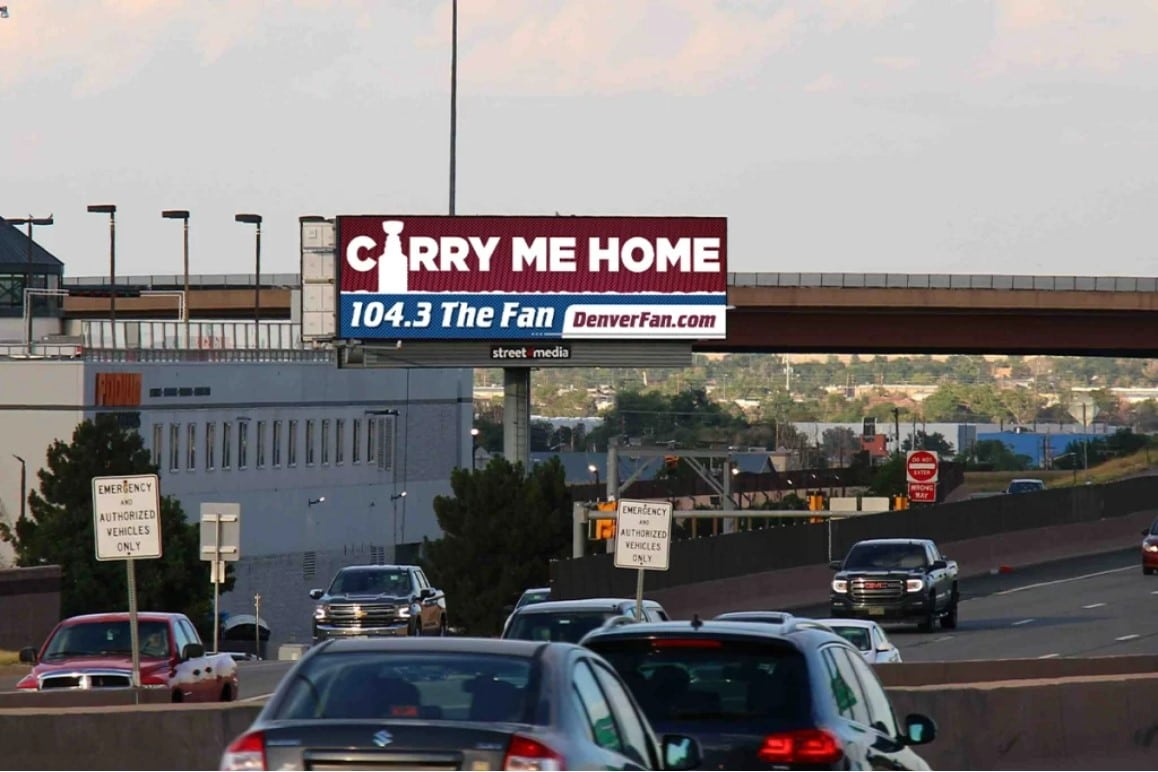State transportation officials have given preferential treatment to Colorado’s largest billboard owners, allowing them to skirt regulations that have been stringently enforced on a small competitor of theirs, a Denver judge has determined. She calls the system “abusive.”
“The court cannot find any legitimate state activity that would support such differential treatment,” District Court Judge Sarah Wallace wrote in a 19-page decision Aug. 6.
“If the state interest at issue is public safety, then CDOT’s enforcement of its own regulations would best serve that interest if enforced uniformly and with intention,” she said.
Wallace’s determination, which the Colorado Department of Transportation declined to comment on, comes in the case of StreetMediaGroup, a Loveland company. SMG has sued CDOT several times in recent years after the agency has denied its permits.
In the case before Wallace, SMG was denied permits for two billboards at 7300 Broadway, where I-25 meets U.S. 36 north of Denver, because they were distractingly close to on-ramps. The company appealed that decision to an administrative law judge, who sided with SMG, but CDOT continued denying the company’s permit applications. So, SMG sued.
“Multiple judicial forums…have correctly seen StreetMedia’s barrage of legal challenges for what they are: dissatisfaction that outdoor billboard advertising is regulated in Colorado,” CDOT wrote in a legal brief in March, urging Wallace to uphold its denials at 7300 Broadway.
The judge saw things differently. She agreed with CDOT that the permit denials did not violate SMG’s free speech rights but found they did violate SMG’s equal-protection rights.
The judge determined that CDOT “continuously renews” at least six permits held by SMG’s larger competitors – Lamar Advertising, Outfront Media and Mile High Outdoor Advertising – for billboards that violate CDOT’s own rules around proximity to on-ramps.
In the case of one billboard, CDOT has even signed an agreement promising “to allow Mile High’s nonconforming sign to operate until federal authorities issue an order that would reduce CDOT’s federal funding,” according to Wallace’s decision last week.
“These facts all indicate CDOT treated (SMG) differently from others,” she wrote.
The exact ramifications of her decision are unclear. Wallace ordered CDOT to issue its own order consistent with her order, but didn’t specify what that order should look like.
“StreetMedia is grateful to the Denver District Court for leveling the playing field by recognizing the inequities in CDOT’s selective enforcement of certain rules and regulations against StreetMedia,” said its lawyer, Chris Carrington, “as compared to how CDOT treats the major players in the outdoor advertising market, where CDOT ‘looks the other way,’ a practice the court correctly characterized as a violation of the equal protection clause.”
SMG has another case in Denver District Court that remains open. In that case, it is suing CDOT for initially approving and later denying it a permit in Larimer County after determining the sign is along a scenic byway. Similar to the case Wallace decided, SMG claims that its trio of top competitors all have billboards along scenic byways — with CDOT’s blessing.
SMG’s lawyers are Carrington with the Richards Carrington firm in Denver, along with Richard Blaiklock and Charles Whybrew at the Lewis Wagner firm in Indianapolis.
CDOT has been represented by Senior Assistant Attorney General Leanne Fobes.
State transportation officials have given preferential treatment to Colorado’s largest billboard owners, allowing them to skirt regulations that have been stringently enforced on a small competitor of theirs, a Denver judge has determined. She calls the system “abusive.”
“The court cannot find any legitimate state activity that would support such differential treatment,” District Court Judge Sarah Wallace wrote in a 19-page decision Aug. 6.
“If the state interest at issue is public safety, then CDOT’s enforcement of its own regulations would best serve that interest if enforced uniformly and with intention,” she said.
Wallace’s determination, which the Colorado Department of Transportation declined to comment on, comes in the case of StreetMediaGroup, a Loveland company. SMG has sued CDOT several times in recent years after the agency has denied its permits.
In the case before Wallace, SMG was denied permits for two billboards at 7300 Broadway, where I-25 meets U.S. 36 north of Denver, because they were distractingly close to on-ramps. The company appealed that decision to an administrative law judge, who sided with SMG, but CDOT continued denying the company’s permit applications. So, SMG sued.
“Multiple judicial forums…have correctly seen StreetMedia’s barrage of legal challenges for what they are: dissatisfaction that outdoor billboard advertising is regulated in Colorado,” CDOT wrote in a legal brief in March, urging Wallace to uphold its denials at 7300 Broadway.
The judge saw things differently. She agreed with CDOT that the permit denials did not violate SMG’s free speech rights but found they did violate SMG’s equal-protection rights.
The judge determined that CDOT “continuously renews” at least six permits held by SMG’s larger competitors – Lamar Advertising, Outfront Media and Mile High Outdoor Advertising – for billboards that violate CDOT’s own rules around proximity to on-ramps.
In the case of one billboard, CDOT has even signed an agreement promising “to allow Mile High’s nonconforming sign to operate until federal authorities issue an order that would reduce CDOT’s federal funding,” according to Wallace’s decision last week.
“These facts all indicate CDOT treated (SMG) differently from others,” she wrote.
The exact ramifications of her decision are unclear. Wallace ordered CDOT to issue its own order consistent with her order, but didn’t specify what that order should look like.
“StreetMedia is grateful to the Denver District Court for leveling the playing field by recognizing the inequities in CDOT’s selective enforcement of certain rules and regulations against StreetMedia,” said its lawyer, Chris Carrington, “as compared to how CDOT treats the major players in the outdoor advertising market, where CDOT ‘looks the other way,’ a practice the court correctly characterized as a violation of the equal protection clause.”
SMG has another case in Denver District Court that remains open. In that case, it is suing CDOT for initially approving and later denying it a permit in Larimer County after determining the sign is along a scenic byway. Similar to the case Wallace decided, SMG claims that its trio of top competitors all have billboards along scenic byways — with CDOT’s blessing.
SMG’s lawyers are Carrington with the Richards Carrington firm in Denver, along with Richard Blaiklock and Charles Whybrew at the Lewis Wagner firm in Indianapolis.
CDOT has been represented by Senior Assistant Attorney General Leanne Fobes.


